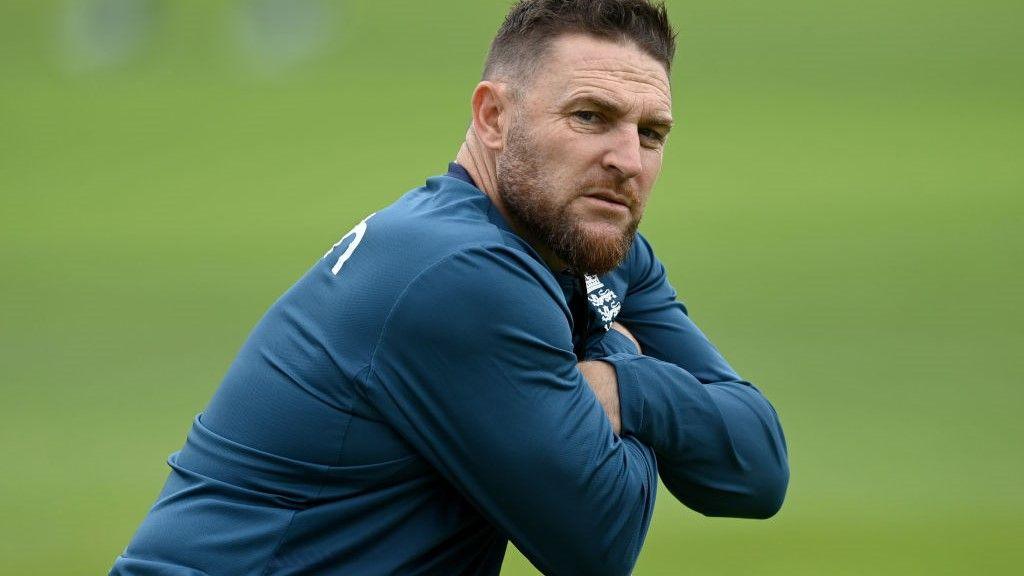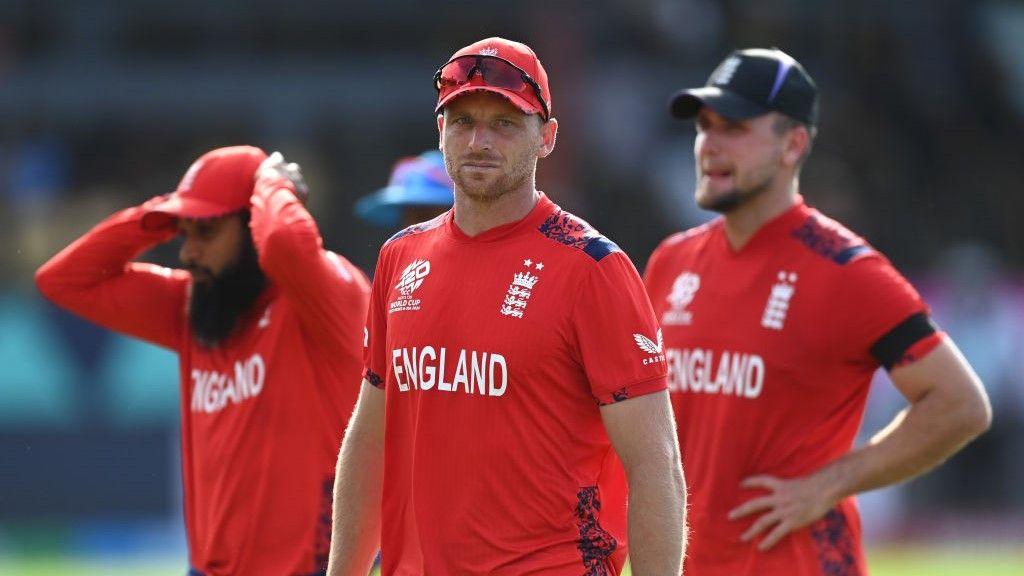Buttler, Stokes, schedule - questions as England go all in on McCullum

Brendon McCullum is in charge of England's men's teams until the end of 2027
- Published
There you have it. England have made their most surprising and exciting appointment since the last time they gave Brendon McCullum a job.
Whispers started emerging over the weekend that England were considering adding the white-ball team to McCullum's remit.
On Tuesday, it was made official. The New Zealander has been asked to sprinkle his Bazball magic on a limited-overs side that has endured a pretty miserable 12 months.
At face value, it is the best possible appointment and a common sense one, too. The white-ball team get one of the best coaches in world cricket and the Test side keep McCullum for two extra years.
The 42-year-old doesn't actually take up his dual role until January and these are some of the things to ponder between now and then.
How will it work?
This is the question that made the idea of McCullum replacing Matthew Mott seem like a non-starter from the off.
How can a man who lives in northern New Zealand commit to the relentless schedule of both England teams? Why would he want to?
The why is perhaps the easier bit. McCullum has always admitted his England gig is "the best job in the world". When in 2022 he took over a Test team that had just one win in 17 matches, he said he wanted a challenge. Combining both roles is certainly that.
It's not like McCullum only spent his downtime from England back at home with rugby, horse racing and wine. During last year’s 50-over World Cup, McCullum was in India as part of a business interest. An improvement on his England salary certainly wouldn't have hurt the deal, either.
The how is slightly more tricky, yet was alluded to by managing director Rob Key when he spoke to Sky Sports last Thursday. England's schedule is easing, meaning there will be fewer times when the Test and white-ball teams overlap.
There are also some practical elements that make it more doable for McCullum. England tour New Zealand both this winter and next winter, for Test and limited-overs matches respectively, so straightaway there are two series when he doesn't have to be away from home.
In reality, his two-year contract extension is little more than 18 months. He was due to finish in early 2026 after the away Ashes and now goes through to the 50-over World Cup in the autumn of 2027.
Naturally, he will need a breather from time to time. Marcus Trescothick is already interim white-ball head coach until the new year and may step up again. Paul Collingwood is another who could lead. Maybe England will take on another full-time assistant. McCullum's great mate Eoin Morgan would fit the bill, while Andrew Flintoff is working with the Test side for the series finale against Sri Lanka this week.
English cricket has been historically poor at exposing its best players to top-level coaching, so giving experience in this situation can only be a good thing in planning for life after Baz.
Can Baz bring the best out of Buttler?

Jos Buttler has not played since the T20 World Cup semi-final defeat in June because of a calf injury
England were double world champions less than a year ago, though a notable feature in their surrender of two World Cups has been the plight of captain Jos Buttler.
He is England's greatest white-ball cricketer of all-time. More concerning than his recent patchy form with the bat has been the inescapable notion that he simply has not been enjoying playing for or captaining his country. He was lucky to survive when Mott left.
McCullum is not really a technical coach. A superb tactician, his super-strength is creating an environment where players relax and thrive. While the Test team partied, it always felt like the white-ball team were in detention. McCullum will now bring his vibes to the limited-overs side and Buttler could benefit the most.
It is not always golf, beer and card games. England's Test team train at a ferocious intensity. McCullum expects a buy-in from his players.
As Key explained: "The great leaders create an environment where people are desperate to play. All we ask in return is that you commit.
"So, if you're not someone who's training as hard as you possibly can, putting everything in and committing to the way that we want to do things, then you're gone."
McCullum will give Buttler and his team plenty of rope, but will pull tight when needed.
England appoint McCullum as white-ball coach
- Published3 September 2024
Bazball to white-ball? Why England should give McCullum limited-overs job
- Published31 August 2024
Is this the end of split coaches?
In theory, the idea of splitting the England head coach responsibilities is a no-brainer. England play and travel as much as any side in world cricket, often with the need to be in two places at once. There is more than enough work [and money] for two coaches.
This is the second time England have tried it and the second time they have reverted to one gaffer in pretty quick time.
Just as Ashley Giles found out when he was white-ball boss to Andy Flower's Test coach more than a decade ago, Mott will have learned that split coaches creates a two-tier system, with the white-ball team missing out.
Yes, Mott was able to win the T20 World Cup in his first few months in charge, but that was with the nucleus of an all-conquering team left behind by Morgan, all while McCullum and Test captain Ben Stokes were still making their mark. Since then, England have focused on the longer format.
Now, it is in McCullum's interests for all teams to be performing well. He can spread players as he sees fit and make long-term plans with every format in mind.
When McCullum finally does ride off into the Kiwi sunset, expect England to replace him with one coach.
More squad crossover?
For logistical reasons there has been a need for separation of personnel when it comes to the various England teams.
That can be a positive because more players get given an opportunity and they have the chance to specialise. The negative is often the multi-format players only turn out for the white-ball teams around major tournaments, leaving the individuals off the pace and the team lacking cohesion.
Now, both red and white-ball teams have undergone a refresh in the past few weeks, leading to a number of new potential multi-format stars. Jamie Smith, Gus Atkinson and Josh Hull are new faces around England's Test team that will feature in the limited-overs series against Australia later this month.
Could McCullum also lean on Harry Brook and Ben Duckett, batters who have thrived in the Test team, but not quite hit the heights in white-ball cricket? Maybe Zak Crawley, too?
What about Stokes, who is yet to confirm his England white-ball future?
And then there is Buttler, the Bazballer who got away. He played the last of his 57 Tests in the pre-McCullum era and there is definitely a sense of potential unfulfilled. At nearly 34, Buttler is marginally older than Stokes and Joe Root, and great mates with both.
If a Jos-shaped hole were to arise in the Test side, would McCullum want him to fill it?
What does it mean for Ben Stokes?
The knock-on of McCullum's appointment as white-ball coach could have huge implications for Stokes, even if his England limited-overs career is over.
For so long, it felt like the Bazball finale was destined to be the 2025-26 Ashes series in Australia. At that point, Harry Potter would defeat Voldemort and everyone would go their separate ways.
Barring an absolute shellacking down under, McCullum will be in charge of the Test side until the next home Ashes in 2027. The continuing presence of his soulmate might entice Stokes into staying on as an England player, captain, or both.
Stokes will be 36 in three years. He is supremely fit and has been reinvigorated by his shiny new left knee, though he has recently been kiboshed by a dicky hamstring. If Baz is around, then Ben may want to be, too.
It could be that English cricket's biggest win from a new McCullum contract is more Stokes.
Related topics
- Published16 August
